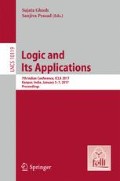Abstract
In this paper, we propose a ternary knowing how operator to express that the agent knows how to achieve \(\varphi \) given \(\psi \) while maintaining \(\chi \) in-between. It generalizes the logic of goal-directed knowing how proposed by Wang in [10]. We give a sound and complete axiomatization of this logic.
Access this chapter
Tax calculation will be finalised at checkout
Purchases are for personal use only
Notes
- 1.
See [12] for a survey.
- 2.
- 3.
This ternary modality is first proposed and discussed briefly in the full version of [10], which is under submission.
- 4.
We can obtain the corresponding axioms by taking the intermediate constraint as \(\top \). Note that in [10], we use the name WKKh for \(\mathtt {UKh}\).
- 5.
In [10], the canonical models are much simpler: we just need MCSs and the canonical relations are simply labeled by \(\langle \psi , \varphi \rangle \) for \(\mathcal {K}h{(\psi ,\varphi )}\in \varGamma \).
- 6.
However, the announcement operator \([\varphi ]\) is not reducible in \(\mathbf {L_{Khm}}\) as discussed in the full version of [10] which is under submission.
References
Ågotnes, T., Goranko, V., Jamroga, W., Wooldridge, M.: Knowledge and ability. In: van Ditmarsch, H., Halpern, J., van der Hoek, W., Kooi, B. (eds.), Handbook of Epistemic Logic, chapter 11, pp. 543–589. College Publications (2015)
Fan, J., Wang, Y., van Ditmarsch, H.: Almost necessary. Adv. Modal Logic 10, 178–196 (2014)
Fan, J., Wang, Y., van Ditmarsch, H.: Contingency and knowing whether. Rev. Symbolic Logic 8, 75–107 (2015)
Gochet, P.: An open problem in the logic of knowing how. In: Hintikka, J. (ed.), Open Problems in Epistemology. The Philosophical Society of Finland (2013)
Gu, T., Wang, Y.: Knowing value logic as a normal modal logic. In: Beklemishev, L., Demri, S., Máté, A. (eds.) Advances in Modal Logic, vol. 11, pp. 362–381 (2016)
Hintikka, J.: Knowledge and Belief: An Introduction to the Logic of the Two Notions. Cornell University Press, Ithaca (1962)
Lau, T., Wang, Y.: Knowing your ability. The Philosophical Forum (2016, forthcoming)
Smith, D.E., Weld, D.S.: Conformant graphplan. In: AAAI, vol. 98, pp. 889–896 (1998)
von Wright, G.H.: An Essay in Modal Logic. North Holland, Amsterdam (1951)
Wang, Y.: A logic of knowing how. In: van der Hoek, W., Holliday, W.H., Wang, W. (eds.) LORI 2015. LNCS, vol. 9394, pp. 392–405. Springer, Heidelberg (2015). doi:10.1007/978-3-662-48561-3_32
Wang, Y.: Representing imperfect information of procedures with hyper models. In: Banerjee, M., Krishna, S.N. (eds.) ICLA 2015. LNCS, vol. 8923, pp. 218–231. Springer, Heidelberg (2015). doi:10.1007/978-3-662-45824-2_16
Wang, Y.: Beyond knowing that: a new generation of epistemic logics. In: van Ditmarsch, H., Sandu, G. (eds.), Jaakko Hintikka on knowledge and game theoretical semantics. Springer, Heidelberg (2016, forthcoming)
Wang, Y., Fan, J.: Knowing that, knowing what, and public communication: public announcement logic with Kv operators. Proc. IJCAI 13, 1147–1154 (2013)
Wang, Y., Fan, J.: Conditionally knowing what. Adv. Modal Logic 10, 569–587 (2014)
Yu, Q., Li, Y., Wang, Y.: A dynamic epistemic framework for conformant planning. In: Proceedings of TARK 2015, pp. 298–318 (2015). EPTCS 2016
Author information
Authors and Affiliations
Corresponding author
Editor information
Editors and Affiliations
Rights and permissions
Copyright information
© 2017 Springer-Verlag GmbH Germany
About this paper
Cite this paper
Li, Y., Wang, Y. (2017). Achieving While Maintaining:. In: Ghosh, S., Prasad, S. (eds) Logic and Its Applications. ICLA 2017. Lecture Notes in Computer Science(), vol 10119. Springer, Berlin, Heidelberg. https://doi.org/10.1007/978-3-662-54069-5_12
Download citation
DOI: https://doi.org/10.1007/978-3-662-54069-5_12
Published:
Publisher Name: Springer, Berlin, Heidelberg
Print ISBN: 978-3-662-54068-8
Online ISBN: 978-3-662-54069-5
eBook Packages: Computer ScienceComputer Science (R0)

